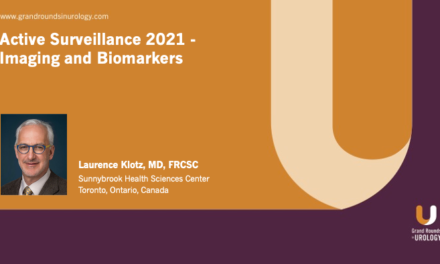Peter Albers, MD, presented “Update on PROBASE Trial: Baseline PSA in Young Men (Aged 45 and 50)” during the 7th Global Summit on Precision Diagnosis and Treatment of Prostate Cancer on September 21, 2023.
This content is available free to the GRU Community. Login or create an account to view it.
How to cite: Albers, Peter. “Update on PROBASE Trial: Baseline PSA in Young Men (Aged 45 and 50).” September 21, 2023. Accessed Oct 2025. https://grandroundsinurology.com/update-on-probase-trial-baseline-psa-in-young-men-aged-45-and-50/
Update on PROBASE Trial: Baseline PSA in Young Men (Aged 45 and 50) – Summary
Peter Albers, MD, provides an update on the ongoing PROBASE trial, which examines the relationship between PSA tests and PCa overdiagnosis. He begins with an overview of the state of PCa screening, noting that there is no current standard practice for using PSA as a screening tool in younger patients.
Dr. Albers shares the background and design of the PROBASE trial, in which more than 46,000 participants were randomized into 2 risk-adapted arms, Immediate Screening and Deferred Screening. The Immediate Screening arm is composed of men who had their PSA levels tested at age 45. The Deferred Screening arm delayed PSA testing until age 50.
After testing, participants in each arm of the trial were classified according to their PSA level. Participants with a PSA level of under 1.5 ng/ml were classified as Low-Risk and only required to repeat testing every 5 years, those with PSA levels between 1.5 and 2.99 ng/ml were considered “Intermediate-Risk” and were required to test every 2 years, and those with PSA levels of 3.0 ng/ml and above were considered “High-Risk” and sent for immediate MRI and biopsy.
Dr. Albers notes that 90% of participants were classified as “Low-Risk,” and have yet to be diagnosed with prostate cancer. In the High-Risk group, 40% were diagnosed with prostate cancer to date.
Dr. Albers concludes by noting that future directions for the study may include investigating the value of MRI, genetic risk factors, the occurrence of other blood/urine-based biomarkers, and other “Smart Screening” mechanisms for early prostate cancer detection. Overall, he notes that the current data supports the hypothesis that PSA testing alone for early detection of prostate cancer creates overdiagnosis with minimal benefit and that risk-adapted screening is effective.
The Global Summit on Precision Diagnosis and Treatment of Prostate Cancer is a unique multi-disciplinary forum organized to inform the key health care stakeholders about the emerging advances in clinical case and research and create a consensus-based vision for the future of precision care and educational and research strategy for its realization. The mission of the Summit is to fill the currently existing gap between the key experts of in vivo imaging, the world authorities in the in vitro fluid- and tissue-based molecular diagnostics, including genomics, and thought leaders in the development of novel observation strategies (e.g., active surveillance, or AS) and therapeutic interventions.
ABOUT THE AUTHOR
Peter Albers, MD, is a Board Member of the European Cancer Organization and Professor of Urology and Chairman of the Department of Urology, Heinrich-Heine-University Düsseldorf, Germany. From 2018 to 2022, he served as Medical Director of the CIO Düsseldorf, Comprehensive Cancer Center at the University Hospital Düsseldorf. In January 2020 he was double appointed Division Head of the newly established Division “Personalized Early Detection of Prostate Cancer” in the National Cancer Prevention Center of the German Cancer Research Center (DKFZ) in Heidelberg.
His special research interests are the development of new risk-adapted screening programs for prostate cancer and clinical research in testicular cancer.





